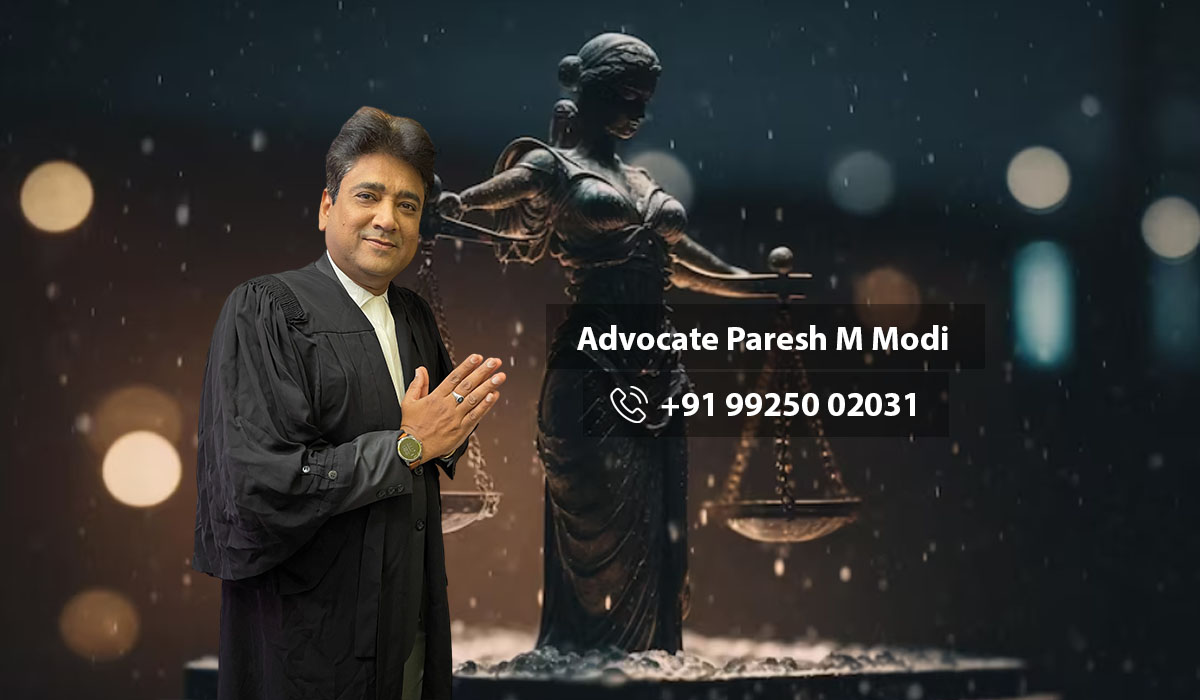गुजरात अहमदाबाद में मेरे नजदीक सर्वश्रेष्ठ वकील | 9925002031 | भारत मे एरपोर्ट के उपर सोने की तस्करी मामले के वकील । परेश एम मोदी
अहमदाबाद शहर और अहमदाबाद जिले में व्यक्तियों और व्यवसायों की कानूनी जरूरतों को पूरा करने वाले एक प्रसिद्ध और उच्च कुशल वकील, एडवोकेट परेश एम मोदी की कानूनी विशेषज्ञता में आपका स्वागत है। कानून के विभिन्न क्षेत्रों में फैले विविध अभ्यास के साथ,
अधिवक्ता परेश एम मोदी को व्यापक कानूनी समाधान प्रदान करने में उनकी दक्षता के लिए पहचाना जाता है।
यहां विशेषज्ञता के प्रमुख क्षेत्रों का अवलोकन दिया गया है:
- कानूनी सलाहकार और सलाहकार: एक अनुभवी कानूनी सलाहकार के रूप में, अधिवक्ता परेश एम मोदी कानूनी मामलों की एक विस्तृत श्रृंखला पर रणनीतिक सलाह और मार्गदर्शन प्रदान करते हैं, यह सुनिश्चित करते हुए कि ग्राहक कानून के अनुपालन में सूचित निर्णय लें।
- चेक रिटर्न केस वकालत (एनआई अधिनियम 138 मामले): अस्वीकृत चेक से संबंधित मामलों में विशेषज्ञता, वकील परेश एम मोदी परक्राम्य लिखत अधिनियम (एनआई अधिनियम) धारा 138 की जटिलताओं को सुलझाने में उत्कृष्ट हैं।
- वैवाहिक और पारिवारिक कानून: वैवाहिक विवादों, विवाह और तलाक के मामलों और विभिन्न पारिवारिक कानून मामलों पर ध्यान देने के साथ, एडॅवोकेट परेश एम मोदी अपने ग्राहकों के हितों की रक्षा के लिए दयालु लेकिन मुखर प्रतिनिधित्व प्रदान करते हैं।
- संपत्ति का स्वामित्व और नागरिक कानून: चाहे वह संपत्ति के स्वामित्व विवादों को हल करना हो या नागरिक मुकदमेबाजी को संभालना हो, अधिवक्ता परेश एम मोदी के पास कानूनी जटिलताओं को संबोधित करने और ग्राहकों के लिए अनुकूल परिणाम सुरक्षित करने की विशेषज्ञता है।
- साइबर अपराध रक्षा: डिजिटल युग में, अधिवक्ता परेश एम मोदी साइबर अपराध के आरोपों के खिलाफ ग्राहकों का बचाव करने में सबसे आगे हैं, व्यक्तियों और व्यवसायों को ऑनलाइन खतरों से बचाने के लिए मजबूत कानूनी रणनीतियों की पेशकश करते हैं।
- ऋण वसूली और क्रेडिट कार्ड विवाद: वकील परेश एम मोदी ऋण वसूली में विशेषज्ञता रखते हैं, निष्पक्ष समाधान सुनिश्चित करने के लिए क्रेडिट कार्ड विवादों, ऋण ईएमआई मुद्दों और वित्तीय मामलों में ग्राहकों का प्रतिनिधित्व करते हैं।
- आपराधिक बचाव: आपराधिक कानून पर ध्यान देने के साथ, अधिवक्ता परेश एम मोदी कई तरह के मामलों को संभालते हैं, जिनमें एनडीपीएस अधिनियम, सीमा शुल्क अधिनियम, हवाई अड्डे के अपराध, अवैध सोने की तस्करी और बहुत कुछ शामिल हैं।
- विल और वसीयत: वसीयत और विरासत के मामलों पर विशेषज्ञ सलाह प्रदान करते हुए, वकील परेश एम मोदी ग्राहकों को भविष्य की पीढ़ियों के लिए उनकी संपत्ति की योजना बनाने और उसकी सुरक्षा करने में सहायता करते हैं।
- सहकारी हाउसिंग सोसायटी और एएमसी विवाद: अधिवक्ता परेश एम मोदी सहकारी हाउसिंग सोसायटी और अहमदाबाद नगर निगम (एएमसी) से जुड़े विवादों से संबंधित कानूनी मुद्दों को संभालने में पारंगत हैं।
- भारत के हवाई अड्डे पर सोने की तस्करी के मामले: अधिवक्ता परेश एम मोदी भारत के किसी भी हवाई अड्डे पर सोने की तस्करी से संबंधित कानूनी मुद्दों से निपटने में अच्छी तरह से वाकिफ हैं, वह आपको मानक के अनुसार कानूनी समाधान के साथ दंड मोचन शुल्क के साथ सोना वापस पाने में मदद कर सकते हैं। सीमा शुल्क अधिनियम के कानून.
भारत में सोने की तस्करी मामले के वकील | 9925002031 | गुजरात भारत में मेरे निकटतम सर्वश्रेष्ठ कस्टम एक्ट वकील | वकील परेश एम मोदी
भारत में, सोने की तस्करी एक आपराधिक अपराध है और विभिन्न कानूनों के तहत आती है। तस्करी और संबंधित अपराधों को संबोधित करने वाले प्रासंगिक अधिनियम और कानून में शामिल हैं:
- सीमा शुल्क अधिनियम, 1962: सीमा शुल्क अधिनियम प्राथमिक कानून है जो भारत में सीमा शुल्क प्रक्रियाओं को नियंत्रित करता है। इसमें सीमा शुल्क अधिकारियों की शक्तियों, माल की निकासी की प्रक्रियाओं और तस्करी जैसे अपराधों के लिए दंड की रूपरेखा दी गई है।
- विदेशी मुद्रा प्रबंधन अधिनियम (फेमा), 1999: फेमा भारत में विदेशी मुद्रा नियमों से संबंधित है। सीमाओं के पार सोने की तस्करी को फेमा का उल्लंघन माना जा सकता है, जिसके कानूनी परिणाम हो सकते हैं।
- मनी लॉन्ड्रिंग रोकथाम अधिनियम (पीएमएलए), 2002: यदि सोने की तस्करी मनी लॉन्ड्रिंग गतिविधियों से जुड़ी है, तो यह मनी लॉन्ड्रिंग रोकथाम अधिनियम के दायरे में आ सकती है।
- भारतीय दंड संहिता (आईपीसी): आईपीसी में चोरी, आपराधिक साजिश और अन्य अपराधों से संबंधित प्रावधान शामिल हैं जो सोने की तस्करी के मामलों में लागू हो सकते हैं।
सोने की तस्करी में शामिल व्यक्तियों को जुर्माना और कारावास सहित गंभीर दंड का सामना करना पड़ सकता है। इसके अतिरिक्त, अधिकारी तस्करी के सामान को जब्त कर सकते हैं। कानूनी परिणामों से बचने के लिए कानूनी और नियामक ढांचे का पालन करना आवश्यक है।
यदि आपको सोने की तस्करी से संबंधित कोई चिंता या संदेह है, तो उचित कानून प्रवर्तन एजेंसियों को मामले की रिपोर्ट करने की सिफारिश की जाती है। गैरकानूनी गतिविधियों में शामिल होने के गंभीर परिणाम हो सकते हैं और व्यक्तियों और पूरे समाज पर नकारात्मक प्रभाव पड़ सकता है।
भारत में प्रमुख अंतरराष्ट्रीय हवाई अड्डे हैं जहां सोने की तस्करी के मामले हुए हैं
- इंदिरा गांधी अंतर्राष्ट्रीय हवाई अड्डा (DEL) – नई दिल्ली एरपोर्ट
- छत्रपति शिवाजी महाराज अंतर्राष्ट्रीय हवाई अड्डा (बीओएम) – मुंबई
- केम्पेगौड़ा अंतर्राष्ट्रीय हवाई अड्डा (बीएलआर) – बेंगलुरु एरपोर्ट
- चेन्नई अंतर्राष्ट्रीय हवाई अड्डा (एमएए) – चेन्नई एरपोर्ट
- नेताजी सुभाष चंद्र बोस अंतर्राष्ट्रीय हवाई अड्डा (सीसीयू) – कोलकाता एरपोर्ट
- राजीव गांधी अंतर्राष्ट्रीय हवाई अड्डा (HYD) – हैदराबाद एरपोर्ट
- कोचीन अंतर्राष्ट्रीय हवाई अड्डा (सीओके) – कोच्चि एरपोर्ट
- सरदार वल्लभभाई पटेल अंतर्राष्ट्रीय हवाई अड्डा (एएमडी) – अहमदाबाद एरपोर्ट
कृपया ध्यान दें कि भारत में कई अन्य हवाई अड्डे भी हैं जो अंतरराष्ट्रीय उड़ानें संचालित करते हैं। मेरे पिछले अपडेट के बाद से अंतरराष्ट्रीय हवाई अड्डों की स्थिति और संख्या बदल गई होगी
अहमदाबाद शहर में शामिल प्रमुख क्षेत्र:
- राणिप – नारणपुरा – वाडज:
अधिवक्ता परेश एम मोदी नारणपुरा के जीवंत इलाके में कानूनी जरूरतों को पूरा करते हैं, संपत्ति विवादों से लेकर वैवाहिक मुद्दों तक के मामलों पर विशेषज्ञ सलाह प्रदान करते हैं।
- मणिनगर – इसानपुर – घोडासर:
मणिनगर के हलचल भरे इलाके में, अधिवक्ता परेश एम मोदी आपराधिक बचाव, साइबर अपराध और पारिवारिक कानून में विशेषज्ञता के साथ जटिल कानूनी परिदृश्यों को सुलझाने में उत्कृष्ट हैं।
- सैटेलाइट – प्रह्लादनगर – आनंदनगर:
सैटेलाइट निवासी चेक रिटर्न मामलों, सहकारी आवास सोसायटी विवादों और अन्य जैसे विविध क्षेत्रों को कवर करने वाले कुशल कानूनी परामर्श के लिए एडवोकेट परेश एम मोदी पर भरोसा कर सकते हैं।
- बोडकदेव – वस्त्रापुर – थलतेज:
अधिवक्ता परेश एम मोदी क्रेडिट कार्ड विवाद, ऋण वसूली और संपत्ति शीर्षक मामलों से संबंधित चिंताओं को संबोधित करते हुए, बोदकदेव के निवासियों को कानूनी सहायता प्रदान करते हैं।
- घाटलोडीया – सोला- साइंस सिटी:
अहमदाबाद के निवासियों के लिए, अधिवक्ता परेश एम मोदी विशेष कानूनी सेवाएं प्रदान करते हैं, जिनमें एनडीपीएस अधिनियम के मामले, हवाई अड्डे से संबंधित अपराध और कस्टम अधिनियम के मामले शामिल हैं।
- हवाई अड्डा रोड – शाहीबाग – आश्रम रोड:
अहमदाबाद के निवासियों के लिए, अधिवक्ता परेश एम मोदी विशेष कानूनी सेवाएं प्रदान करते हैं, जिनमें एनडीपीएस अधिनियम के मामले, हवाई अड्डे से संबंधित अपराध, कस्टम अधिनियम के मामले और सोने की तस्करी के मामले शामिल हैं।
- सीजी रोड – नवरंगपुरा – आम्बावाड़ी:
नवरंगपुरा अहमदाबाद के निवासी कुशल कानूनी सलाह के लिए एडवोकेट परेश एम मोदी पर भरोसा कर सकते हैं, जो चेक रिटर्न मामलों, व्यापार लेनदेन विवाद, सहकारी आवास सोसायटी विवादों और अन्य जैसे विविध क्षेत्रों को कवर करते हैं।
अहमदाबाद जिले गुजरात में शामिल क्षेत्र:
- गांधीनगर:
गांधीनगर में एक प्रमुख कानूनी व्यक्ति के रूप में, अधिवक्ता परेश एम मोदी निषेध अधिनियम, नियमित जमानत मामलों और सहकारी आवास सोसायटी विवादों से जुड़े मामलों को संभालते हैं।
- सानंद:
साणंद गुजरात के औद्योगिक केंद्र में, वकील परेश एम मोदी संपत्ति विवादों, तलाक के मामलों और वसीयत और वसीयत मामलों से संबंधित कानूनी चिंताओं को संबोधित करते हैं।
- धोलका:
धोलका के निवासी चेक रिटर्न मामलों, साइबर अपराध मुद्दों और आपराधिक बचाव मामलों को संभालने में एडवोकेट परेश एम मोदी की विशेषज्ञता से लाभ उठा सकते हैं।
- मेहसाणा:
अधिवक्ता परेश एम मोदी मेहसाणा के निवासियों को कानूनी सहायता प्रदान करते हैं, जिसमें पारिवारिक कानून, बैंकिंग मुद्दे और कस्टम अधिनियम मामलों सहित कानूनी सेवाओं की एक विस्तृत श्रृंखला शामिल है।
- नडियाद:
ऐतिहासिक शहर नडियाद में, वकील परेश एम मोदी संपत्ति के स्वामित्व विवादों, क्रेडिट कार्ड विवादों और एफआईआर से संबंधित मामलों को संभालने में अपने कानूनी कौशल के लिए प्रसिद्ध हैं।
कानूनी विशेषज्ञता:
– कानूनी सलाहकार और कानूनी सलाहकार:
अधिवक्ता परेश एम मोदी एक विश्वसनीय कानूनी सलाहकार के रूप में कार्य करते हैं, जो विभिन्न कानूनी क्षेत्रों में रणनीतिक सलाह प्रदान करते हैं।
– चेक रिटर्न केस वकील – एनआई अधिनियम 138 मामले वकील:
अनादरित चेक से संबंधित मामलों में विशेषज्ञता रखते हुए, अधिवक्ता परेश एम मोदी परक्राम्य लिखत अधिनियम (एनआई अधिनियम) धारा 138 की जटिलताओं को सुलझाने में उत्कृष्ट हैं।
वैवाहिक वकील और पारिवारिक कानून अधिवक्ता:
अधिवक्ता परेश एम मोदी वैवाहिक विवादों, विवाह और तलाक के मामलों और पारिवारिक कानून मामलों में दयालु लेकिन मुखर प्रतिनिधित्व प्रदान करते हैं।
– संपत्ति का शीर्षक और सिविल कानून वकील:
चाहे वह संपत्ति के स्वामित्व संबंधी विवादों को सुलझाना हो या नागरिक मुकदमेबाजी को संभालना हो, अधिवक्ता परेश एम मोदी के पास कानूनी जटिलताओं को दूर करने की विशेषज्ञता है।
– साइबर अपराध बचाव वकील:
अधिवक्ता परेश एम मोदी साइबर अपराध के आरोपों के खिलाफ ग्राहकों का बचाव करने में सबसे आगे हैं, व्यक्तियों और व्यवसायों को ऑनलाइन खतरों से बचाने के लिए मजबूत कानूनी रणनीति पेश करते हैं।
– ऋण वसूली और क्रेडिट कार्ड विवाद केस के वकील:
ऋण वसूली में विशेषज्ञता, अधिवक्ता परेश एम मोदी क्रेडिट कार्ड विवादों, ऋण ईएमआई मुद्दों और वित्तीय मामलों में ग्राहकों का प्रतिनिधित्व करते हैं।
– आपराधिक बचाव वकील:
आपराधिक कानून पर ध्यान केंद्रित करने के साथ, अधिवक्ता परेश एम मोदी कई तरह के मामलों को संभालते हैं, जिनमें एनडीपीएस अधिनियम, सीमा शुल्क अधिनियम, हवाई अड्डे के अपराध, अवैध सोने की तस्करी, हवाई अड्डों पर नशीली दवाओं की तस्करी और बहुत कुछ शामिल हैं।
– गुजरात उच्च न्यायालय के वकील:
एक अनुभवी व्यवसायी के रूप में, अधिवक्ता परेश एम मोदी गुजरात उच्च न्यायालय में ग्राहकों का प्रतिनिधित्व करते हैं, उच्चतम स्तर पर कानूनी विशेषज्ञता और प्रतिनिधित्व प्रदान करते हैं।
निष्कर्ष:
अनुभव, समर्पण और ग्राहक-केंद्रित दृष्टिकोण को संयोजित करने वाले कानूनी प्रतिनिधित्व के लिए, जटिल कानूनी परिदृश्य को सुलझाने में अधिवक्ता परेश एम मोदी को अपना विश्वसनीय कानूनी भागीदार मानें। अपनी विशिष्ट आवश्यकताओं के अनुरूप वैयक्तिकृत और प्रभावी कानूनी समाधानों के लिए आज ही हमसे संपर्क करें। विभिन्न कानूनी क्षेत्रों में अपनी दक्षता के लिए, एडवोकेट परेश एम मोदी एक विश्वसनीय कानूनी सलाहकार और सलाहकार के रूप में खड़े हैं, जो व्यापक ग्राहकों को व्यापक समाधान प्रदान करते हैं।
आप एडवोकेट परेश एम. मोदी को उनके मोबाइल नंबर: 9925002031 पर कॉल कर सकते हैं और “advoatepmodi@gmail.com” पर ई-मेल कर सकते हैं।





